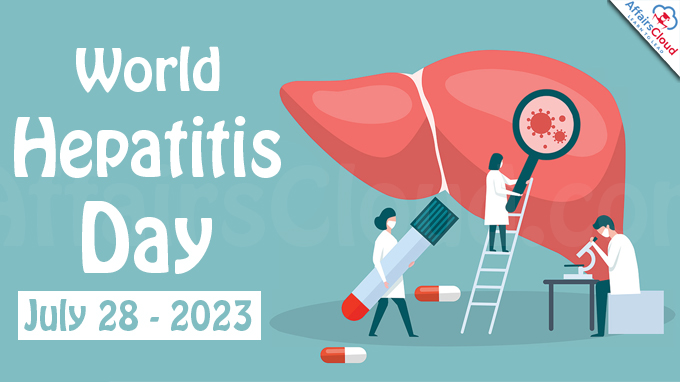
The World Health Organization’s (WHO’s) World Hepatitis Day (WHD) is annually observed across the globe on the 28th July to create awareness and educate people about the effect of viral hepatitis.
- The theme for WHD 2023- “One Life, One Liver” which creates awareness in the public by emphasizing the need for prevention, early detection, and adherence to prescribed treatment.
- ‘We’re Not Waiting’ is the campaign theme for WHD 2023.
Hepatitis:
i.Hepatitis is an inflammation of the liver, often caused by viral infections.
ii.Five main strains of the hepatitis virus – A, B, C, D, and E – are responsible for the majority of cases but they differ in important ways including modes of transmission, severity of the illness, geographical distribution and prevention methods.
iii.Hepatitis B and C are the most common, accounting for over 90% of hepatitis-related deaths.
iv.Chronic hepatitis infections can lead to severe health issues, including cirrhosis, liver cancer, and liver failure.
History of WHD:
World Hepatitis Day, initially observed on May 19, was later moved to July 28 in 2010.
i.World Hepatitis Alliance established in 2007 organized the first ever community-led WHD in 2008.
ii.The 63rd World Health Assembly in May 2010 in Geneva, Switzerland adopted various resolutions on a variety of global health issues including the resolution WHA63.17 proclaiming the 28th July of every year as WHD.
iii.The 1st WHOs, WHD was observed on 28th July 2011.
Why 28th July?
The date was chosen to honor the birth anniversary of Dr Baruch Samuel Blumberg a physician and geneticist, who discovered the hepatitis B virus (HBV)in 1967 and developed the first hepatitis B vaccine, for which he was awarded the Nobel Prize in Physiology or Medicine in1976.
WHO on Hepatitis:
i.According to WHO estimates, approximately 325 million people worldwide live with chronic hepatitis, and over 1.3 million deaths occur annually due to hepatitis-related complications.
ii.WHO has set up a goal to achieve hepatitis elimination by 2030. To achieve this, the WHO urges countries to achieve specific goals:
- Reduces new infections of hepatitis B and C by 90%.
- A 65% reduction in hepatitis-related deaths from cirrhosis and cancer.
- Make sure that at least 90% of people infected with hepatitis virus (B and C) are diagnosed.
- At least 80% of eligible individuals receive appropriate care.
- Provision of chronic hepatitis B treatment access to all pregnant women and birth vaccines to their infants in order to prevent HBV infection.
WHD aligns particularly with three Sustainable Development Goals (SDGs):
- Good Health and Well-being (SDG 3)
- Partnerships for the Goals (SDG 17) and
- Reduced Inequalities (SDG 10).
About World Health Organisation(WHO):
Director-General- Dr Tedros Adhanom Ghebreyesus
Headquarters- Geneva, Switzerland
Founded in- 1948




